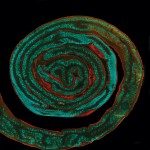Lien vers Pubmed [PMID] – 30293722
Lien DOI – 10.1016/j.cub.2018.08.044S0960-9822(18)31128-X
Curr Biol 2018 Oct; 28(20): 3244-3253.e7
Tobacco addiction is a chronic and relapsing disorder with an important genetic component that represents a major public health issue. Meta-analysis of large-scale human genome-wide association studies (GWASs) identified a frequent non-synonymous SNP in the gene coding for the α5 subunit of nicotinic acetylcholine receptors (α5SNP), which significantly increases the risk for tobacco dependence and delays smoking cessation. To dissect the neuronal mechanisms underlying the vulnerability to nicotine addiction in carriers of the α5SNP, we created rats expressing this polymorphism using zinc finger nuclease technology and evaluated their behavior under the intravenous nicotine-self-administration paradigm. The electrophysiological responses of their neurons to nicotine were also evaluated. α5SNP rats self-administered more nicotine at high doses and exhibited higher nicotine-induced reinstatement of nicotine seeking than wild-type rats. Higher reinstatement was associated with altered neuronal activity in several discrete areas that are interconnected, including in the interpeduncular nucleus (IPN), a GABAergic structure that strongly expresses α5-containing nicotinic receptors. The altered reactivity of IPN neurons of α5SNP rats to nicotine was confirmed electrophysiologically. In conclusion, the α5SNP polymorphism is a major risk factor for nicotine intake at high doses and for relapse to nicotine seeking in rats, a dual effect that reflects the human condition. Our results also suggest an important role for the IPN in the higher relapse to nicotine seeking observed in α5SNP rats.





